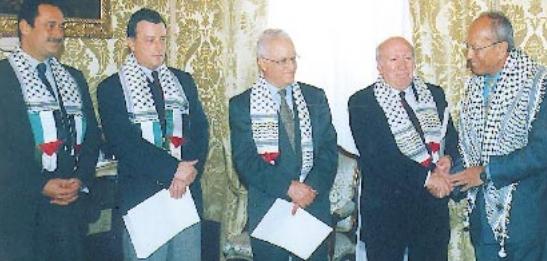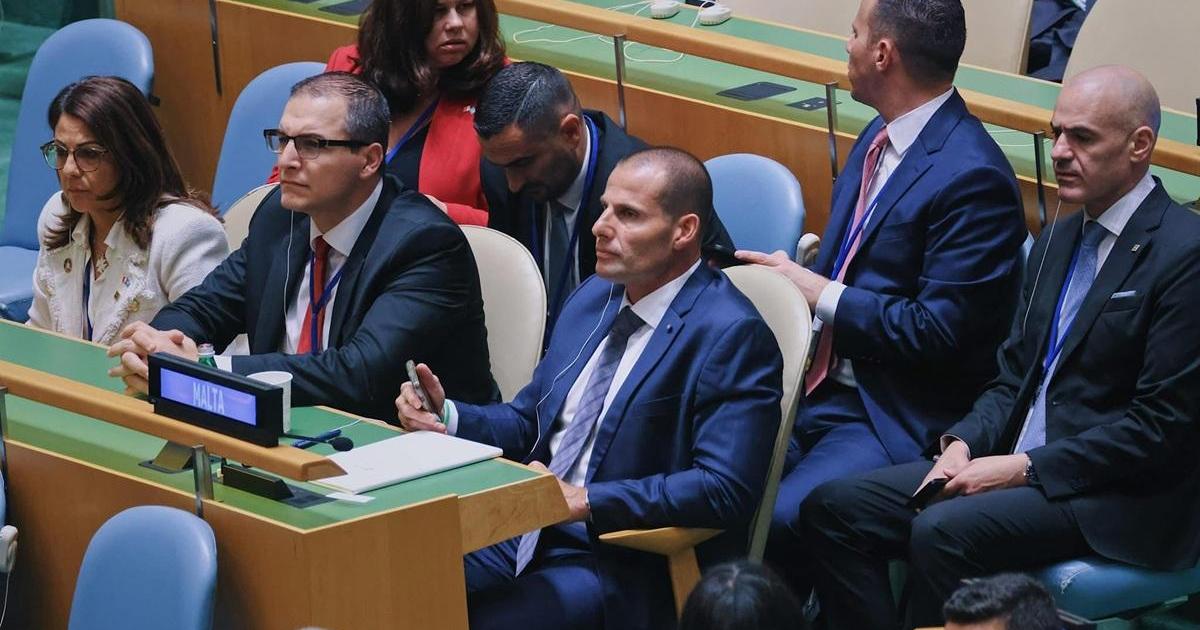Robert Abela said he cried when he met injured Palestinian children being treated for their injuries as Malta formally recognised Palestine on Monday.
Malta joined France, Andorra, Belgium, Luxembourg, Monaco and San Marino in recognising the Palestinian state at the United Nations General Assembly in New York.
Over the weekend, the United Kingdom, Canada and Australia also announced their recognition of Palestine.
Prime Minister Abela, who attended the assembly together with Foreign Minister Ian Borg and other dignitaries, announced Malta’s recognition at the yearly UN meeting.
In his speech, Abela said the decision to recognise Palestine was a demonstration of its concrete commitment to a genuine and peaceful two-state solution as the only solution that will secure the future of both people.
He said that since then, Malta has been calling for the unconditional release of all the remaining hostages.
“No ifs, no buts. The hostages must come home. And come home now,” Abela said.
‘Malta and allies want Hamas wiped out’
In his speech, Abela dismissed the suggestion that recognition of Palestine represents a victory for Hamas, saying such a view couldn’t be “further from reality”.
“They (Hamas) want to see Israel wiped off the map. Malta and our allies want to see Hamas wiped out.”
He said the right to recognition brings a huge responsibility for the Palestinian leadership, and that Hamas must have no role in the future government of Palestine.
He ended his speech calling on the attacks on civilians and infrastructure to stop “immediately”.
“Starvation is being suffered in Gaza, and the deaths of hungry civilians trying to access the pitiful trickle of food aid being allowed in cannot be allowed to go on,” Abela said.
Tuning in an emotional tone, Abela said he was not ashamed to admit he cried when he recently visited young children from Gaza who were brought to Malta for medical care. Some even required prosthetics.
“These innocent children have had their limbs and the best part of their lives stolen away from them, they have lost their parents, and they have been caused irreparable harm,” he said.
“But we will not allow their hope for a better future to be stolen away from them, and we will protect them. Ibrahim – I promised you that, and we will stick to our word.”
He said the path to a functioning two-state solution is a “long and hard one”.
“We know the dangers that lie along that path. But we also know the greater dangers of saying nothing can be done- that the dream has died.”
He said Malta is proud to stand with its allies and to support the proposals on the two-state solution.
“Just because something is hard, doesn’t make it impossible.”
Malta was initially slated to formally recognise Palestine last year, alongside Norway, Spain and Ireland, but postponed the declaration, saying it was waiting for the “right circumstances” before taking the step.
Earlier this year, Abela indicated that this recognition would arrive during a scheduled United Nations conference in June, only for the conference to be postponed at the last minute.
The government’s move comes amid pressure from within its own ranks, with several of its MEPs and MPs having publicly backed calls for the government to recognise Palestine.
The opposition Nationalist Party had also called on Malta to recognise Palestinian statehood sooner rather than later.
In a statement, the Nationalist Party welcomed the government’s recognition of the State of Palestine, albeit late.
“The government kept stalling on this important issue, and the decision to recognise the Palestinian State this evening is nothing more than a recognition of the Palestinian people’s right to sovereignty,” the statement read.
Signed by Shadow Minister for Foreign Affairs Beppe Fenech Adami and PN international secretary Beppe Galea, the PN said it expects Abela to take a clear and principled position on the proposed sanctions and the suspension of the EU-Israel Association Agreement in the face of the ongoing genocide of the Palestinian people in Gaza.
What does recognising Palestine mean?
Although formal recognition may have only arrived on Monday, bilateral relations between Malta and Palestine have been strong for decades.
In November 1988, Malta signed a UN declaration acknowledging “the right of the Palestinian people to a state of their own,” a position sometimes misinterpreted as formal recognition of the Palestinian state, even within the UN’s own records.
By the mid-1990s, Malta had established a Palestinian representative office in Valletta, eventually opening a representative office in the West Bank city of Ramallah in 2009.
Although recognition of Palestinian statehood is primarily a symbolic step, signalling Malta’s support for Palestine in light of what the UN has described as genocide, it also has repercussions on diplomatic ties between the two countries.
With Malta now formally recognising the Palestinian state, the representative office in Malta is set to be upgraded to full embassy status, with its head recognised as the Ambassador of Palestine.
Meanwhile, the status of Malta’s representative in Ramallah will also be upgraded to that of ambassador.
It remains to be seen what impact the move will have on relations with Israel, with ambassador designate Ruth Cohen Dar last month describing it as a “strong prize to Hamas”.
This is not the first time that Malta and Israel have been at odds.
In 2002, Maltese leaders, including President Guido de Marco, Prime Minister Eddie Fenech Adami and Opposition leader Alfred Sant donned a keffiyeh in a meeting with representatives of the Palestinian community before joining a peace march.
 Maltese political leaders wearing a keffiyeh at a 2002 meeting with the Palestinian community. File photo: Alfred Giglio
Maltese political leaders wearing a keffiyeh at a 2002 meeting with the Palestinian community. File photo: Alfred GiglioThe incident sparked a harsh reaction from then-Israeli ambassador Ehud Gol, who described the leaders as “naïve”.
In 2010, the Maltese government filed a protest with its Israeli counterpart, after Bianca Zammit, a Maltese activist, was shot in the leg while attending a demonstration at the Gaza border.
At the time, the Israeli ambassador to Malta Gideon Meir had claimed that Zammit was “sent by Hamas”.
